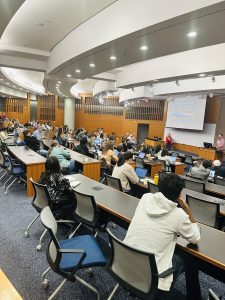
Our next guest speaker will be Dr. Adam Gormley on Friday, November 3, 2023 at 3:00 pm in Wilkinson 132. Dr. Gormley is an Associate Professor of Biomedical Engineering at Rutgers University and an expert in nanobiomaterials. Prior to Rutgers, Adam was a Marie Skłodowska-Curie Research Fellow at the Karolinska Institutet (2016) and a Whitaker International Scholar at Imperial College London (2012-2015) in the laboratory of Professor Molly Stevens. He obtained his PhD in Bioengineering from the University of Utah in the laboratory of Professor Hamid Ghandehari (2012), and a BS in Mechanical Engineering from Lehigh University (2006). In January 2017, Adam started the Gormley Lab which seeks to develop bioactive nanobiomaterials using robotics and artificial intelligence. Dr. Gormley is currently the PI of an NIH R35 MIRA Award, an NSF CBET Award, and an NSF Designing Materials to Revolutionize and Engineer our Future (DMREF) Award. He was recently named a Rising Star by Advanced Healthcare Materials, is the recipient of the A. Walter Tyson Assistant Professorship, the Young Innovator Award by Cellular and Molecular Bioengineering, and the Presidential Fellowship for Teaching Excellence.
Gormley’s abstract: The seamless integration of synthetic materials with biological systems long remains a grand challenge, often curtailed by the sheer complexity of the cell-material interface. For decades, biomaterial scientists and engineers have designed around this complexity by rationally designing new materials one experiment at a time. However, recent advances in laboratory automation, high throughput analytics, and artificial intelligence / machine learning (AI/ML) now provide a unique opportunity to fully automate the design process. In this seminar, we put forth our efforts to develop a biomaterials acceleration platform (BioMAP) (i.e., self-driving biomaterials lab) that can rapidly iterate through design spaces and identify unique material properties that perfectly synergize with biological complexity.










